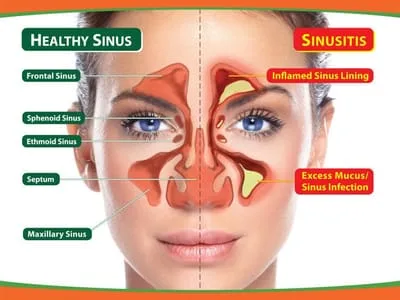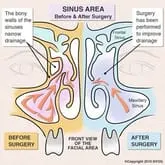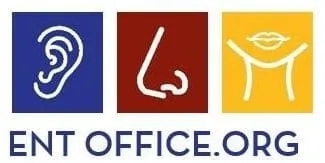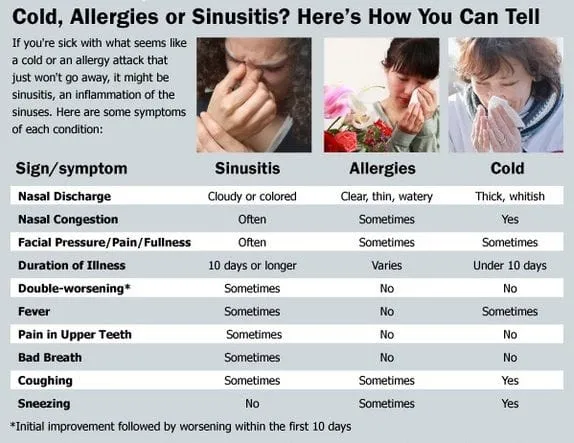Have you ever had a cold or allergy attack that would not go away? If so, there’s a good chance you actually had sinusitis. Experts estimate that 37 million people suffer from sinusitis each year, making it one of the most common health conditions in America. That number may be much higher, since the symptoms of bacterial sinusitis often act like those of colds or allergies, and many sufferers never see a doctor for proper diagnosis and treatment.
This worksheet may help you think more about your sinus problems. If you end up making an appointment with one of our doctors for your sinuses, bring this Sinus Questionnaire with you. It will help them make a better treatment plan.
What is Sinus Disease?

Normally, mucus collecting in the sinuses drains into the nasal passages. When you have a cold or allergy attack, your sinuses become inflamed (swollen) and are unable to drain. This can lead to congestion and infection.
The Physician and Physician's Assistants can diagnose acute sinusitis if you have up to 4 weeks of pus draining from the nose accompanied by nasal obstruction (not being able to breathe through the nose), facial pain/pressure/fullness, or both. The sinus infection is likely bacterial if it continues for 10 days or longer, or if the symptoms worsen after an initial improvement.
When Does Sinusitis Become “Chronic”?
When you have frequent sinusitis, or the infection lasts three months or more, it could be chronic sinusitis. Symptoms of chronic sinusitis may be less severe than those of acute sinusitis, but untreated chronic sinusitis can cause damage to the sinuses that sometimes requires surgery to repair.
How is it Treated?
Antibiotic Therapy
Therapy for bacterial sinusitis should include an appropriate antibiotic. If you have three or more symptoms of sinusitis (see chart below), be sure to see your doctor. An oral (by mouth) or nasal spray or drop decongestant may be recommended to relieve congestion, although you should avoid prolonged use of non-prescription nasal sprays or drops. Inhaling steam or using saline nasal sprays or drops can help relieve sinus discomfort.
Antibiotic resistance means that some infection-causing bacteria are immune to the effects of certain antibiotics prescribed by your doctor. Antibiotic resistance is making even common infections, such as sinusitis, challenging to treat. You can help prevent antibiotic resistance. One way is to wait up to 7 days before taking antibiotics for mild sinus infections, allowing time for your body to fight the infection naturally. If the doctor prescribes an antibiotic, it is important that you take all of the medication just as your doctor instructs, even if you feel better before the medicine runs out.
Intensive Antibiotic Therapy
If your doctor thinks you have chronic sinusitis, intensive antibiotic therapy may be prescribed. Surgery is sometimes necessary to remove physical obstructions that may contribute to sinusitis.

Surgery can be considered only if medical treatment fails or if there is a nasal obstruction (blockage) that cannot be corrected with medications. The type of surgery is chosen to best suit the patient and the disease.
Before surgery, be sure that you have realistic expectations for the results, recovery, and postoperative (after surgery) care. Good results require not only good surgical techniques, but a cooperative effort between the patient and physician throughout the healing process. It is equally important for patients to follow pre- and postoperative instructions.
When Should I see my Doctor About my Sinuses?
Because the symptoms of sinusitis sometimes mimic those of colds and allergies, you may not realize you need to see a doctor. If you suspect you have sinusitis, review these signs and symptoms. If you suffer from three or more, you should see your doctor.
Test Your Sinuses:
Take the Quiz
Print it out and bring it to your next appointment.
Endoscopic Sinus Surgery
Functional endoscopic sinus surgery (FESS) is recommended for certain types of sinus disease. With the endoscope, the surgeon can look directly into the nose, while at the same time, removing diseased tissue and polyps and clearing the narrow channels between the sinuses. The decision whether to use local or general anesthesia will be made between you and your doctor, depending on your individual circumstances.
Can Children Get Sinus Infections?
Your child’s sinuses are not fully developed until they reach 20 years old, but they can still suffer from sinus infections (sinusitis). The maxillary (behind the cheek) and ethmoid (between the eyes) sinuses are present from birth.
Sinusitis is difficult to diagnose in children because respiratory (lung) infections are more frequent, and symptoms can be subtle (hard t0 notice). Unlike a cold or allergy, “bacterial sinusitis” requires a physician’s diagnosis and treatment with an antibiotic to prevent future complications.
What are the signs of a sinus infection in a child?
- a low-grade fever
- thick yellow-green nasal drainage (mucous)
- post-nasal drip (mucous dripping down the throat), sometimes leading to (or exhibited as) a sore throat, cough, bad breath, nausea and/or vomiting
- headache, but usually not before age 6
- irritability or fatigue (feeling tired all over)
- swelling around the eyes
If these symptoms continue despite appropriate medical therapy, care should be taken to seek an underlying cause. The role of allergy and frequent upper respiratory infections should be considered.
Tips to Prevent Sinusitis
As always, an ounce of prevention is worth a pound of cure. To avoid developing sinusitis during a cold or allergy attack, keep your sinuses clear by:
- Using an oral (by mouth) decongestant or a short course of nasal spray decongestant
- Gently blowing your nose, blocking one nostril while blowing through the other
- Drinking plenty of fluids to keep nasal discharge (mucous) thin
- Avoiding air travel. If you must fly, use a nasal spray decongestant before take-off to prevent blockage of the sinuses, allowing mucous to drain
- If you have allergies, try to avoid contact with things that trigger attacks*. If you cannot, use over-the-counter or prescription antihistamines and/or a prescription nasal spray to control allergy attacks
*Allergy testing, followed by appropriate allergy treatments, may increase your tolerance of allergy-causing substances.

